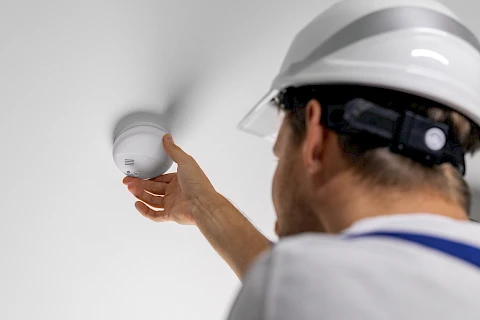
As the cold months roll in, many seniors rely more on heating systems, fireplaces, and space heaters to stay warm. While these provide comfort, they also increase the risk of fire and carbon monoxide (CO) exposure. Taking the time to learn about the dangers and how to prevent them can help you keep senior loved ones safe as the temperatures plunge.
Fire and CO Risks
Winter brings specific risks related to fire and CO poisoning. Heating equipment, like space heaters and fireplaces, is often the cause of winter fires in senior homes. Seniors typically need extra warmth due to medical conditions or muscle mass loss as they age. This can lead to increased reliance on heating appliances, which can be dangerous if not used properly.
There is also the silent threat of carbon monoxide (CO). It is an odorless, colorless gas produced by burning fuel. Common sources include furnaces, gas stoves, and space heaters. Exposure to CO can cause symptoms ranging from headaches to life-threatening conditions.
Age-related factors often leave seniors more vulnerable to these hazards. Reduced mobility and slower response times can prevent quick evacuation during emergencies. Acknowledging these risks is the first step in prevention and creating a safer environment for senior loved ones.
Proper Maintenance of Heating Equipment
Regular inspections of heating equipment are key to identifying potential problems before they escalate. Investing in safety upfront is better than dealing with the consequences later. Professionals should service heating systems routinely to ensure they're in good working order.
Ensure fireplaces are cleaned and checked by professionals yearly. Before using space heaters, inspect them for any signs of wear. Keep them away from flammable materials, and never leave them running unattended.
Installing and Testing Detectors
Detectors are a critical line of defense against fire and CO hazards. Every senior home should have both smoke and carbon monoxide detectors installed. Smoke detectors provide early warnings of fires, while CO detectors alert you to dangerous gas levels.
Install detectors in every bedroom, kitchen, and common area to ensure safety. Place them away from windows or vents to avoid triggering false alarms. Always follow manufacturers' guidelines for placement.
Testing detectors regularly is just as crucial as proper installation. Check them monthly to ensure they work correctly. Replace batteries every six months. Never ignore a chirping detector, as it signals a low battery that needs immediate attention.
Developing an Emergency Evacuation Plan
Create an emergency evacuation so senior loved ones know what to do during a fire or other emergencies. Determine primary and secondary escape routes from each room in the home. Practice these routes regularly with the senior loved ones to familiarize them with the evacuation plan and identify potential obstacles. Choose a safe meeting place outside the house where family members can gather after an evacuation.
Make Winter Cozy and Safe for Seniors With Senior Helpers’ Support
Keeping seniors safe and warm during winter requires thoughtful preparation, proactive measures, and the right support. If you're considering professional assistance to ensure the well-being and safety of a senior loved one in West Hartford, Farmington, New Britain, Bloomfield, and Berlin, we can help. Senior Helpers Central West Hartford provides professional senior home care solutions, including home safety evaluation, assistance with daily living tasks, companionship and conversation, and more. Contact us for more information!